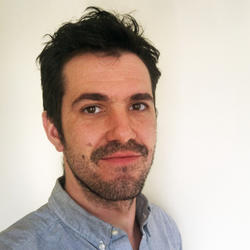Clement Valla

Clement Valla is an artist and programmer interested in processes that produce unfamiliar artifacts and skew reality. Valla works within systems, applying a ‘programmed brain’ that pushes problem-solving logic to irrational ends. His recent work examines copies, repetition and reproduction markets – from Chinese ‘Oil-Painting Factories’ to drawings on Amazon’s Mechanical Turk. This work explores the tension between individual creativity and the influence of systems and networks on the individual.
Valla received a BA from Columbia University in 2001, where he studied architecture. After working for architects in the USA, France, and China, Valla began using computers and digital technologies in his own work. He studied the intersection between art and computer programming at the Rhode Island School of Design’s Digital+Media MFA program.
He has collaborated with a number of artists, architects, designers, scientists and archaeologists, developing novel uses for digital technologies. His work has been shown and published internationally. He is currently a full time faculty member in the Graphic Design Department at RISD.
Academic areas of interest
Valla writes instructions and computer code in order to explore systems. His programs are generative. They rely on chance, randomness, repetition and recombination in order to produce complex and unexpected images that lie on the boundary between nature and artifice. He finds systems that produce unintended artifacts, unexplored juxtapositions. Glitches, not designed effects. He collects these strange occurrences.
Valla explores an authorless world at the intersection of human labor and digitized systems, a blurred boundary between human creativity and machine intelligence where computers are built to think increasingly like humans and where humans act like computers, and uses them as metaphors for looking at nature and humanity. In this ambiguous territory, he plays notions of the hand-made, the mechanical, the natural and the systematic off of one another.
Courses
Fall 2023 Courses
CTC 2009-01
CODE AS MEDIUM
SECTION DESCRIPTION
In this advanced level art and design course, students will explore the creative potential of code as an artistic medium in its own right. Through a series of projects and exercises, students will develop their coding practice in a way that complements their ongoing studio practice and gain a deeper understanding of the unique opportunities and challenges of working with code as an artistic medium.
Building on the foundational skills and concepts learned in CTC-1000 Introduction to Coding or an equivalent coding course, students will dive deeper into coding as an artistic medium, exploring advanced techniques for generative art, interactive installations, and other forms of digital media. They will be introduced to a range of tools and frameworks for creative coding, such as Processing, p5.js, and openFrameworks. Students will also examine the historical and cultural context of code as a medium, including the role of technology in shaping contemporary art and design practices. Through readings and discussions, they will explore the implications of code as a means of expression.
Open to Undergraduate Students.
Elective
Spring 2024 Courses
FOUND 1004-13
STUDIO: DESIGN
SECTION DESCRIPTION
Studio: Design promotes multidisciplinary studio experimentation across an array of media and processes. Students explore the organization of visual and other sensory elements in order to understand perceptual attributes and the production of meaning. Using various methods of expression, students may create objects, spaces, and experiences that demonstrate their analysis of composition, color, narrative, motion, systems, and cultural signification. Assignments allow for inquiries into scientific, social, cultural, historical, philosophical, technological, and political topics. Critical and experimental utilization of design principles, which underpin all of the arts, are emphasized. Students are guided through progressive investigations, in which the act of seeing is amplified by the study of physiological and cognitive factors that generate perception. Examined subjects are taken through stages of representation, abstraction, and/or symbolic interpretation to reveal essential communicative properties.
Enrollment is limited to first-year undergraduate students.
Major Requirement | BFA
CTC 2054-01
ENVISIONING UMWELT
SECTION DESCRIPTION
n this class, we will use a range of contemporary technologies to explore the unique ways in which different organisms experience the world. Through microscopy, photography, 3D scanning, 3D modeling, AR, VR, and machine learning, we will gain insights into the sensory perceptions and mental models of other species.
Imagine you had an eye on each foot. What would the world look like from that vantage point? What kind of picture would your brain make as your 2 feet crossed each other and pointed in opposite directions? We can do more than imagine, and strap some cameras to our feet and use software to synthesize a new kind of picture. Can an experiment like this help us understand how starfish see the world? After all starfish have eyes on the ends of all five of their legs.
We will also learn about recent discoveries in the field of animal senses, such as the ability of plants to hear the sound of water, pollinators to see colors beyond human perception, and birds to sense magnetic fields. This will help us understand the concept of "umwelt," which refers to the unique ways in which organisms experience the world.
Through readings, lectures, field trips and student projects, this class will be a critical re-imagining of contemporary technologies and a radical re-thinking of more-than-human senses.The goal of the class and student projects is to spark curiosity, wonder, kinship, and most importantly a sense of humility for our place in a vast and complex world, a large part of which lies beyond human senses. How could we imagine radical new ways of perceiving our planet? And in doing so, how might we decenter humans’ umwelt, and become more attuned and open to more than human ways of seeing the world?
Estimated Cost of Materials: $100.00
Elective